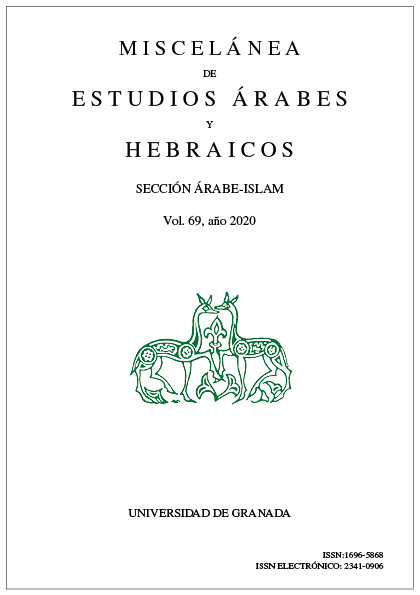Andalusi reflections of latin sillybus
DOI:
https://doi.org/10.30827/meaharabe.v69i0.1037Keywords:
Etymology, Toponymy, Andalusi Arabic, Sillybus, JilgueroAbstract
The Latin plant name sillybus, „a kind of thistle‟, had been proposed as the etymon of the Spanish jilguero (goldfinch), but this idea was rejected by Menéndez Pidal and Corominas, who went so far as to question the very existence of the phytonym in the Latin of Hispania, given the absence of written testimony. In the present article, Arabic has been used as an alternative method of confirmation, since there was no evidence in Latin, and medieval Arabic botanical repertoires were searched. The term is found, but the presence of graphical alterations and errors indicates that it is a bookish term and not common lan- guage. However, the evidence of Andalusi place names derived from *sillybarium, 'land of thistles', corroborates the initial proposal and also helps to explain place names such as Chirivella (Valencia) or Chirivel (Almería), which had received erroneous interpretations. This etymon did become part of colloquial speech and it sheds new light on some rude invective words of uncertain etymology, such as a whole family of expressions to which the much-discussed gilipollas (asshole/idiot) belongs.
Downloads
Downloads
Additional Files
Published
How to Cite
Issue
Section
License
The authors publishing their work in this journal agree to the following terms and conditions:
1. The authors retain the copyright and give the journal the right to be the first publication of the work and also to be licensee under a Creative Commons Attribution License which allows others to share the work, provided the author of the work and the initial publication in this journal are acknowledged.
2. Authors may make additional agreements separately for the non-exclusive distribution of the version of the work published in the journal (for example, putting it in an institutional repository or publishing it in a book), with acknowledgement of its initial publication in this journal.
3. Authors are allowed and encouraged to electronically disseminate (for example, in institutional repositories or on their own web page) the published version of their works (publisher's post-print version) or, if not possible, the author's reviewed and accepted post-print version. This is to facilitate productive exchanges, and allow for earlier and greater citation by third parties of the published works (See The Effect of Open Access).
4. The journal accepts no responsibility for the opinions expressed by the authors.



















